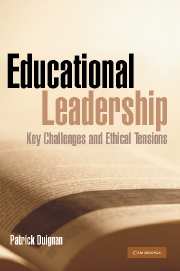Book contents
- Frontmatter
- Contents
- Acknowledgements
- Introduction and overview
- 1 Contemporary leaders and leadership under the spotlight
- 2 Key challenges for educational leaders
- 3 Leadership challenges as tensions
- 4 A framework for analysing tensions
- 5 Values and ethics in decision-making
- 6 A method for ethical decision-making
- 7 Shared and distributed leadership in schools
- 8 Why we need capable educational leaders
- 9 Why we need authentic educational leaders
- 10 Forming capable and authentic educational leaders
- References
- Index
6 - A method for ethical decision-making
Published online by Cambridge University Press: 05 June 2012
- Frontmatter
- Contents
- Acknowledgements
- Introduction and overview
- 1 Contemporary leaders and leadership under the spotlight
- 2 Key challenges for educational leaders
- 3 Leadership challenges as tensions
- 4 A framework for analysing tensions
- 5 Values and ethics in decision-making
- 6 A method for ethical decision-making
- 7 Shared and distributed leadership in schools
- 8 Why we need capable educational leaders
- 9 Why we need authentic educational leaders
- 10 Forming capable and authentic educational leaders
- References
- Index
Summary
Educational leaders require methods and processes that will assist them to probe ‘the ethical depths of each situation that calls for a judgement’ (Rebore, 2001, p. 31). They need these methods more than ever before as they enter a period of great change, uncertainty, and ethical relativism. Too few educational leaders today have a background or formal formation in ethical decision-making.
To assist leaders to consider the ethical dimensions of tension situations and make informed and wise choices in such challenging situations as those discussed in chapters 2 and 3, the following ethical decision method is proposed. It is best if such a method is used within a group context so that responsibility for the final solution to an ethical tension is shared. Also, most, if not all, of the steps in the proposed method lend themselves to dialogue and serious discussion among key stakeholders. This is a point that will be more fully developed in chapter 7.
Proposed method for ethical decision-making
To be consistent and coherent in approaching ethical decision-making, educational leaders need to have some method of working with and through the issues that face them. Making ethical judgements when facing complex ethical situations is hard enough already, without adding the problem of not knowing where to start or how to proceed. The following ten steps will help leaders to make more effective decisions in situations of ethical tension:
Determine the nature of the situation.
Clarify the facts.
Identify the players.
Think of several options for action.
Evaluate options using different ethical approaches.
[…]
- Type
- Chapter
- Information
- Educational LeadershipKey Challenges and Ethical Tensions, pp. 93 - 104Publisher: Cambridge University PressPrint publication year: 2007



